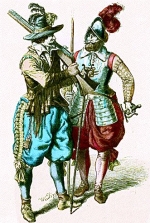
Back to alternative history
Contents
1. The Spanish Match
2. A Walk in the Bohemian Forest
3. Soupe de Canard
4. A Song for Europe
5. The Imperialists Return
6. The King of Spain's Daughter
7. Never Mind the Uzkoks
8. The Day of the Dupe
9. The Black Adder
10. Every Man an Elector
11. Oliver's Army
12. I Dreamed I Saw Phil Ochs Last Night
|
| Just Another Thirty Years War With Steam |
|---|
|
| Part 8 |
|---|
|
"The part contingency plays in history can never be underestimated. The most outrageous turn of fortune, that would never be believed in a novel, is happenstance during the annals of Europe. In the War in question there are several such incidents. The death of Gustavus on the eve of the Battle of Leipzig from a surfeit of Lutfisk and Raggmunk [1]; Wallenstein's boarding of the express train ahead of the Cardinal-Infante's cavalry...
"The greatest reversal of the War was undoubtedly the events following the signing of the Treaty of London on November 11, 1631."
- 'Thirty Years of Death and Sex: 1618-1648', David Parker and Geoffrey Ogg, editors (Hull University Press, 1865)
|
|
|
John Felton felt the comfortable weight of the musket on his shoulder. He had picked out his vantage point; no-one would come to this part of St Paul's on a Tuesday.
The terms of the treaty by now were known by the barrow-boys in the marketplace. A humiliating backdown for England. No monetary compensation for losses. And King Charles promising to deny all aid to the Huguenots.
But for John, this time it was personal. A veteran of the disastrous campaign to the Île-de-France. The vessel carrying the siege engine had foundered and the ram equipped locomotive lost. Yet Buckingham had persisted and the naval expedition had continued down the Seine, in a fool's errand to provoke a Huguenot rising so far from their strongholds. Once the Duke himself came under fire the campaign had become an abortive rout. John had been lucky to survive.[2]
Yet John Felton did not dwell on his luck. Rather he nursed a grudge. With parliament not sitting due to the King's displeasure, there was no money to be had to pay off the survivors. And now Buckingham had just signed a treaty ensuring there would be no money coming from the French, who had killed so many of John's comrades. He could not even afford the musket but for the generosity of the Portuguese traveler.
After his waiting, he could see the horse guards gallop into view. And here came the open carriage. God be praised! It was taking the expected route.
Everything had been carefully measured. The powder. The ball rammed home just so. As a naval lieutenant John had not practiced much musketry. But he had read. Oh yes, he had read!
Finally the carriage came to the closest point to John's place of concealment. He pulled the trigger causing a shower of sparks in the snaphance. The gunpowder in the priming pan exploded with a loud bang. Despite his readiness John was pushed backwards by the force of the explosion.
|
|
|
Buckingham was feeling vaguely displeased. He was left with the feeling that somehow the Cardinal had the better of him. Yet the treaty he had signed seemed to have advantages all England's way. The war with France was over, a war England no longer had the financial means to fight, ship money or no. England would not join a war between Spain and France but that was all to the good. If England could not fight France she could certainly not fight mighty Spain.
The Spanish ambassador, Don Diego Sarmiento de Acuña, Count of Gondomar, had suggested that this clause might invalidate a clause of the King's marriage treaty with Spain. England, he insisted, was pledged to come to Spain's aid in the event of a French attack. King Charles had waved a hand, promising he would have a courtier produce a learnèd pamphlet showing how this was not the case. Gondomar had glowered but Buckingham cared not. If truth be told the man had been insufferable since Charles' engagement those eight years ago. Don Diego had hoped to use his position in London as a stepping stone for higher office. Yet his long hoped for recall had not happened. Acuña seemed to be out of favor with the court in Madrid ever since the Spanish match. Buckingham had no idea why. Although Don Diego had been in good form at the ceremonial signing this morning, even going out of his way at the end to wish Buckingham goodbye.
Then the Cardinal said something to pull Buckingham out of his funk. In a low voice Richelieu said, "The young Dauphin Louis, every day 'e looks more and more like you."
Buckingham was delighted. He was so happy he leaned across the carriage to kiss the Cardinal on both cheeks. Richelieu put up one hand, as if to push Buckingham away... or to point at something.
There was a loud 'Crack!' that seemed to echo in the street.
In horror, Buckingham saw the Cardinal's head move back and to the left. Back and to the left...
|
|
|
The last the people of London saw of John Felton was him being dragged to the Tower of London, shouting all the way, "I was a dupe!"
[To be continued]
|
|
|
[1] The Swedes charged into battle, carrying all before them, with Gustavus' last words on their lips, "I should have had the Sipulipiirakka!" [3]
[2] In our timeline Buckingham had commanded an expedition to the Île de Ré in 1627, an campaign a competent general should have won. This timeline's expedition to the Île-de-France was doomed from the outset, for the obvious reasons.
[3] Some revisionist historians claim the words were "I can't believe I ate the whole thing!" Just ignore them.
|
|
|

